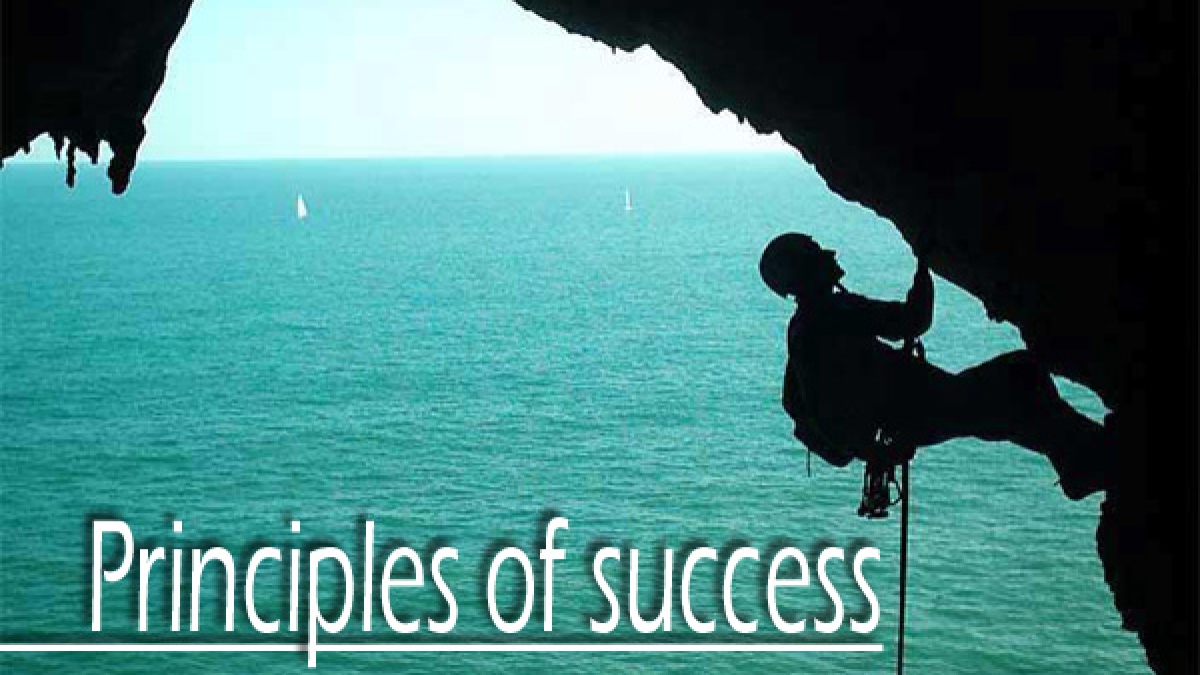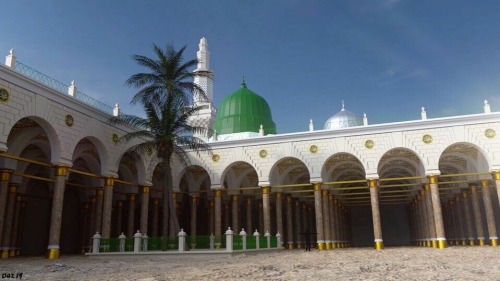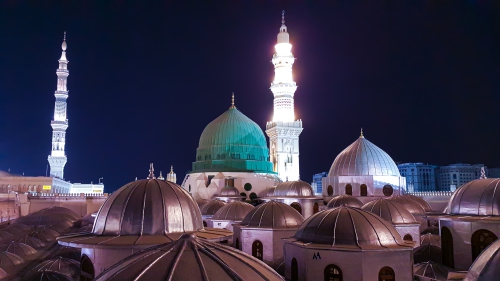Principles of Success

According to the Quran, Prophet Muhammad was the most excellent example for all of humanity. Even non-Muslim historians recognize him to be one of the most successful personalities in history.
In 1946 Reverend R Bosworth-Smith in "Mohammed & Mohammedanism." wrote about the Prophet:
"Head of the state as well as the Church, he was Caesar and Pope in one; but, he was pope without the pope's claims, and Caesar without the legions of Caesar, without a standing army, without a bodyguard, without a palace, without a fixed revenue. If ever any man had the right to say that he ruled by a right divine It was Mohammad, for he had all the power without instruments and without its support. He cared not for dressing of power. The simplicity of his private life was in keeping with his public life."
In 1978 Michael Hart in his book " The 100 Most Influential Persons In History", selected Prophet Muhammad as the most influential person in history and had this to say about his choice:
"My choice of Muhammad to lead the list of the world's most influential persons may surprise some readers and may be questioned by others, but he was the only man in history who was supremely successful on both the secular and religious level... It is this unparalleled combination of secular and religious influence which I feel entitles Muhammad to be considered the most influential single figure in human history."
The Prophet's words and actions show us the way to achieve success, not just in this world but in the hereafter as well.
In short, the Prophet of Islam was a positive thinker in the full sense of the word. All his activities were result-oriented. He refrained from all negative elements of behavior that are counter-productive to achievement such as hate, envy, arrogance, greed, etc.
All the actions of the Prophet were solely based on a pure intention to please God.
By studying the life of the Prophet we can identify some of the principles of success.
The First Principle:
Take the easier path. This principle is well explained in a saying of A'ishah. She said:
Whenever the Prophet had to choose between two options, he always opted for the easier choice. (Bukhari)
To choose the easiest option means that you should evaluate your options and choose the most feasible. One who begins from this starting point will surely reach his goal.
The Second Principle:
See advantage in disadvantage. In the early days of Makkah, there were many problems and difficulties. At that time, a guiding verse in the Quran was revealed. It said:
With every hardship there is ease, with every hardship there is ease. (94:5-6).
This means that if there are some problems, there are also opportunities at the same time. The way to success is to overcome the problems and avail the opportunities.
The Third Principle:
Change the place of action. This principle is derived from the Hijrah. The Hijrah was not just a migration from Makkah to Madinah, it was a journey to find a more suitable place to put Islam into action.
Physical migration and perseverance is an important element in establishing Justice and Peace. This also planted the roots of intellectual migration from the subjugated minds to an awakened spirit.
The Fourth Principle:
Make a friend out of an enemy. The Prophet of Islam was repeatedly subjected to practices of antagonism by the unbelievers. At that time, the Qur'an enjoined upon him the return of good for evil. And then, as the Quran added:
You will see your direst enemy has become your closest friend. (41:34)
It means that a good deed in return of a bad deed has a conquering effect over your enemies. And the life of the Prophet is a historical proof of this principle.
The greatest example of amnesty was shown by the Prophet after the blood-less conquest of Makkah. All enemies of Islam were granted pardon including Hinda, the wife of Abu Soofyaan who had disemboweled the martyred body of Hamza, the Prophet's uncle. In spite of her detestable mutilation of Hamza's body, the Prophet forgave her.
The Fifth Principle:
Education is central to success. After the battle of Badr, about 70 of the unbelievers were taken as prisoners of war. They were educated people. The Prophet announced that if any one of them would teach ten Muslim children how to read and write he would be freed. This was the first school in the history of Islam in which all of the students were Muslims, and all of the teachers were from the enemy rank.
The Sixth Principle:
Don't be a dichotomous thinker. In the famous battle of Mutah, Khalid Ibn Walid decided to withdraw Muslim forces from the battlefield because he discovered that they were disproportionately outnumbered by the enemy. When they reached Madinah, some of the Muslims received them by the word 'O deserters!' The Prophet said: 'No, they are men of advancement'.
Those Madinan people were thinking dichotomously, either fighting or retreating. The Prophet said that there is also a third option, and that is to avoid war and find time to strengthen yourself. Now history tells us that the Muslims, after three years of preparation, advanced again towards the Roman border and this time they won a resounding victory.
The Seventh Principle:
Do not engage in unnecessary confrontation. This principle is derived from the treaty of Hudaybiyyah. At that time, the unbelievers were determined to engage Muslims in fighting, because they were in an advantageous position. But the Prophet , by accepting their conditions unilaterally, entered into a pact. It was a ten-year peace treaty. Until then, the meeting ground between Muslims and non-Muslims had been on the battlefield. Now the area of conflict became that of ideological debate. Within two years, Islam emerged as victorious because of the simple reason of its ideological superiority.
The Eighth Principle:
Gradualism instead of radicalism. This principle is well-established by a Hadith quoted in Bukhari. A'ishah says that the first verses of the Qur'an were related mostly to Heaven and Hell. After some time when faith had taken hold in peoples hearts, God revealed specific commands to desist from unjust and self-deprecating social practices that were prevalent in the Arabian dark ages. This is a clear proof that for social changes, Islam advocates the evolutionary method, rather than the revolutionary method.
The Ninth Principle:
Be pragmatic in controversial matters. During the writing of the Hudaybiyyah treaty, the Prophet dictated these words: 'This is from Muhammad, the Messenger of God.' The Qurayshan delegate raised objections over these words. The Prophet promptly ordered the words to be changed to 'Muhammad, son of Abdullah'. This simple change placated the Qurayshan delegate.
These are just some of the principles by which the Prophet of Islam conducted his life. His achievements have been recognized by historians as the supreme success. We would be wise to live by following his example.
You have indeed in the Messenger of God a beautiful pattern (of conduct) for any one whose hope is in God and the Final Day .. (Quran 33:21)
Adapted from the "Principles of Success in the Light of Sirah" by Wahiduddin Khan - Renaissance Islamic Journal
Related Suggestions
Farah - I think you are being unjust to the author regarding the sixth principle that he mentioned. He never said anything about giving up the rightful struggle to establish Islam. This is what he said, "The Prophet said that there is also a third option, and that is to avoid war and find time to strengthen yourself."
Most importantly, you don't realize, but you unintentionally have raised question about our Prophet's (pbuh) decision that supported the action of Khalid (rad) to withdraw the Muslim force. This is dangerous!!
We all should be careful not to let our anger overcome our Muslim way of thinking, which does not permit extremism of any kind. And questioning our Prophet(pbuh) is not something we should even dare think about!
And never tell Muslims to give up compassion! This is what have won over many enemies rather than the sword! Compassion or sternness will be decided based upon the situation, but compassion should always be the first choice for a Muslim. That is why war is dictated by strict rules in Islam to avoid bloodshed as much as possible.
May Allah guide us all!
May Allah bless us all!
May Allah forgive us all!
Day,and remembers Allah much.Rasulullah is of course the best example you can find anywhere in the World.He was perfect example for all human beings.If you are a leader be it King,President Prime Minister he was like that.If one is a soldier by profession he was the best General strategist commander,teacher the best who taught the companions and student the best that of Jibrael,husband the best one of Ummahatul Muminin. Father that of Fatimah and others.
Doctor the best one who relied on his Creator to give cure,neighbour the best we could find anywhere, Da,i the best preacher and inviter towards Allah,Alim the greatest scholar ever,Judge he was the Chief Justice of the Supreme Court as well as Khalifa.Haji Sab the one who performed the best Hajj even though it was only once,so also Umrah he showed the way.Ramadan and any other aspect of Ibadah Rasulullah showed the best example.If you think you are poor so also the Prophet if you are rich he didnt bother about wealth although he had the best access to wealth,muttaqi who fears Allah Rasulullah feared Him more than any person.In terms of bravery he did not fear anybody except Allah.These are few of his qualities we can think of and of course many more we could not mention due to luck of space we can go on narrating qualities of this best of human beings.
He possessed all these qualities but he remained contented with his title as Rasulullah and Servant of Allah who was ready to sacrifice every thing for the sake of Allah.That was Muhammadur Rasulullah whose name is being mentioned millions of times every day all over the World,although he was great but he never attributed greatness to himself but only to his Creator Allah (S.W.T) who guided us to this Deen which the Prophet brought for the whole humanity.We pray Allah to give us taufiq to follow the Sunnah Ways of our beloved Prophet Muhammad (S.A.W)up to death.
1)al adiah la tubarriru al wasilah
2)ma dalla alal haram huwa haram
thank you
I wonderful writeup and relevant for everyone.
Assalaamo Alaikum.
Article is excellent by the original author Wahiduddin Khan and in its adoptation by Islamicity.
Congratulations & May Allah reward you for it.
Mukhlis.
this article is a summary of principles of huzoor(s.a.w.a.s.).this article can be spread among the muslim youth and our muslim brothers.it can show them the values of sunnahs performed by huzoor(s.a.w.a.s.) as these are its direct results.i am glad that allah made me discover this site thrugh myself and i got a diamond from it.may allah bless all the people responsible for this article and for this great website.
it is for sure a very effictive step toward abetter understanding about the holy prophet SAW.
May Allah (swt) reward the people who documented the life of our prophet Muhammad from the time he was a live to our time.
There are many ways to describe him and the best ofthem all: He was the most excellent example for all of humanity, He was a walking Quran.......
A big philosopher one time said the best way to change a person is to change the way he or she thinks.
For example the person who thought that the driver seat in a car should be in the right side of the car, don't you think that he maid a change? Or how about the Ohio brothers who really made a big change, I think they were bored to death no thing to do and he told his brother I think I can fly, and probably his brother said you crazy man. Thanks to them I am in the states and I can take a Boeing 777 back home.
Back to us and our problems, we are still busy debating how we should do Wudu or some billion other things that still we argue about.
Our Umah is slowly waking up, but unfortunately not in a sweet way the way a mother wakes up her child with tender and a kiss and breakfast in the table.
I see our Umah as a camel in deep sleep waking up by some wild human shooting arrows into his body, but the camel slowly getting up with blood all over his body even his own body parts are not helping each other the front legs try to carry all the weight while the back ones still stretching out.
Give it time it will, it will, it will get up, just stand by and watch. And don't feel bad all the Umah is watching not just you & I, it's normal we are just debating how we should help.
Our problems are our own it is not fare to blame any other group but our own selves. We have the Quran and Sunna of our beloved prophet all what we need is practice, practice, practice....the bottom line we need
To change our selves and we need to help people to change the way they think.
The ten principles that br. Wahiduddin Khan summarize for us in this article is a way to make that change.
You always have excellent articles keep up the good work.
THANK YOU
- the idea of graduality is also an excellent one.
"If greatness of purpose, smallness of means and astounding results are the three criteria of human genius, who could dare to compare any great man in modern history with Muhammad? The most famous men created arms, laws and empires only They founded, if anything at all, no more than material powers which often crumbled away before their eyes. This man moved not only armies, legislation, empires, peoples and dynasties but millions of men in one-third of the then-inhabited world; and more than that, he moved the altars, the gods, the religions, the ideas, the beliefs and souls.... his forbearance in victory, his ambition, which was entirely devoted to one idea and in no manner striving for an empire; his endless prayers; his mystic conversations with God; his death and his triumph after death; all these attest not to an imposture but to a firm conviction which gave him the power to restore a dogma. This dogma was two-fold: the unity of God and the immateriality of God-the former telling what God is, the latter telling what God is not; the one overthrowing false gods with the sword, the other starting an idea with the words. Philosopher, orator, apostle, legislator, warrior, conqueror of ideas, restorer of rational dogmas, of a cult without images, the founder of twenty terrestrial empires and of one spiritual empire: that is MUHAMMAD. As regards all the standards by which human greatness may be measured, we may well ask IS THERE ANY MAN GREATER THAN HE?"
..The Great Historian Larmartine.
Its definitly an eye opener for me as a new muslimah and Inshallah the sunnah i shall follow for years to come.
Jazakilahu khairin to the staff of ths wonderfull site.May Allah swt reward u all for ur outstanding efforts and continual motivation. Ameen
If we all follow these examples conscientiously in our daily lives, things would be so much better. The trouble is we think we know too much without referring to the Sunnah of our beloved Prophet s.a.w. Our Prophet was not only a religious figure but also a very practical person.
Rest how zealots think. It is their problem. I am sure on one can win a religious argument from anyone in these days as all of us are full of contradictions. Don't expect any leadership or resolve from Muslim scholars and leaders as they are also riding the same boat of contradictions and lack of character. The only thing that is possible is to have our own knowledge correct about Islam and have integrity and character that is expected of us and last but least be all you can be. Rest Allah knows better. We are just here to mess up his created things.
Peace
may peace be upon him our beloved prohpet muhaamed (scw)

















